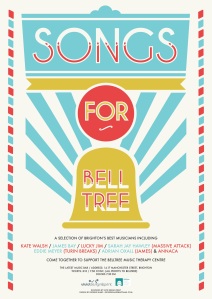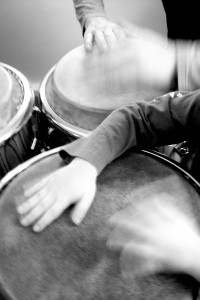I recently caught up with Belltree Music Therapy Centre’s Tina Warnock, and asked her to share her thoughts on music therapy, Belltree Centre and National Music Therapy Week…
Could you briefly define ‘music therapy’ for those who are new to the idea of the tre atment?
atment?
TW: I feel the best way to describe music therapy is to say that it’s a psychological therapy, because immediately you understand the depth of the training. Sometimes people assume that it’s music-making for fun. Music therapy is a psychological therapy which uses the qualities of music as a tool to work with- to communicate with people who find it difficult with words. It’s not necessarily about a tune or something that sounds pleasant, but using sounds and rhythm, silence and all the parts that make up music to communicate.
What was it that drew you to music therapy in the beginning- was it a single event, or culmination of experiences?
TW: It was the single event of reading that music therapy exists, which was like a light bulb coming on. But that reaction was due to the fact that music had always been important to me. I was becoming a singer, and I was building relationships with people that seemed to be much richer than I’d had previously, through sharing music making together. I was quite shy as a teenager but playing the piano helped me to find those connections with myself and others, that I didn’t find it that easy before.
How do you typically conduct your sessions?
TW: Well generally, you allow the client to lead the session; I find a place within the room, at the piano or on a chair with my guitar, and if they’re quite young I would greet them with a song that we sang every week to say ‘hello’. Not necessarily a jolly song- it’s quite open, but it’s a way that’s quite useful for autistic children or young children. Sometimes, they’ll just come in and start bashing on the drums immediately, but that sets the tone, and I’ll perhaps play the piano to join in with them, and then we take it from there really.
So it’s relative approach for each person, then?
TW: It’s totally different for each person, yes, depending on their personality, state of mind and the nature of their difficulties. If I’m doing a group session with young children, I tend to structure it quite tightly at the beginning, and then as they get to know that, we can open it out so that the music can go off in a different direction. We’d start and end it in the same way every week, because these are often children that find it difficult to manage change and unpredictability.
Could you tell me a bit about the history of Belltree Music Therapy Centre- when it was founded, and to what end?
TW: I was working in London, part-time, but I was also working four sessions a week at Down’s View School, and I was not enjoying going up to London anymore. Then one of Down’s View’s buildings was vacated by the sixth-formers. I realised that space was available and that coincided with my thoughts of wanting to set something up locally. So, I chatted to the head and we came to an arrangement- which rooms I could use, and I just dived into it, really. I operated as a sole-trader under my name to start with, and then after a year I changed it to a community interest company. I drew advice from my local business link and business community partnership that gave guidance on how to start up a business.
Sounds very much like you had to learn on your feet.
TW: I went to all kinds of seminars and workshops, made a business plan and realised it wasn’t making much money. I’ve learned a lot and it’s been three years now… I’m that kind of person- you want something to happen, you talk about it for a bit, then you get on and do it.
I was trying to create a place where music therapists could learn from each other and could have a shared working life. It’s very easy to just be isolated and surrounded by people who don’t understand what it is you do. It’s much nicer to have colleagues.
And it’s coming together slowly- I mean, we’re starting to make decisions together now and even though it’s my company- I’m the director, we’ve got a management committee so different therapists are helping to lead in different client groups.
It’s very difficult because some parts of the country have had this for twenty years, so it’s frustrating that it takes so long…
I suppose in that sense you’re not only building your business, you’re attempting to build awareness locally?
TW: The NHS around here has never had a music therapy post, where other areas have had them for twenty years, so it’s really about infiltrating a system that thinks ‘I don’t need it’. It is very difficult to get into some hospital systems- you have to do a pilot study for six months, get to know them and show them the value of what you do, and then they might consider it. There’s quite a lot of that when you start out- giving your time and expertise for free in order to try and get yourself some work.
Do you feel that as time goes by, more people are becoming aware of the benefits of music therapy?
TW: Yeah, I think it is growing, and with the internet it’s easier to get information to pop up in people’s computers- you know, without them even wanting it there (laughs). I still think there’s a lot of misconception about what we do, and why it’s different to a normal music group.
Do you find that frustrating? What’s the most irritating misconception that someone might come to you with?
TW: I find it less irritating than I used to. You come out of training and you feel you’ve got to be the purest practitioner and you think everyone should be more aware than they are. Now I understand why they’re not, and if I wasn’t a music therapist, I probably wouldn’t be either.
You’ve just got to realise that it’s normal not to know, because you can’t come into sessions and watch, so unless you’ve been to a talk to see videos and had a presentation, you’re not going to know. But, lots of music therapists do get frustrated.
What would you say are the key differences between music therapy and other therapies- apart from the use of music as opposed to another method?
TW: The unique properties of music. You can play notes on a harp that just give you a feeling immediately, or you could play on a drum kit and it makes you feel a certain way. Choose any instrument, and normally it has an emotional response for each person. Not the same one for each sound, because that’s quite individual according to your personal history, but I think because music is a physical vibration as well, it works in quite a holistic, whole-body, kind of way. The associations are very, very strong with each person. So it’s that access to emotion, that fast access to emotions, and way of expressing feelings without saying anything that is most important.
With art or play therapy, you might use verbal interpretation more necessarily. We do use it, but it doesn’t have to be used for the experience to be meaningful. There’s a debate about that within music therapy itself, especially between people who work with mentally ill adults- do they need to be able to discuss what’s going on in the music verbally to make the most of the therapy? Or is the musical interaction itself enough?
In your work, you co-operate with doctors and parents, but do you ever have any contact with other arts therapists?
TW: Occasionally, but not very often. I know there are NHS teams who have whole art therapy departments, but these seem to have disseminated more into teams with specialist members, rather than specialist departments, which is a bit of a shame.
Sometimes I do recommend someone goes to, say, a play therapist because they’re so resistant to the music. They might start building towers from drums and chatting to the shaker, so while I could work with them, and get supervision from a play therapist, sometimes it’s better to refer them on.
What is your involvement in National Music Therapy Week, and what do you hope it achieves?
TW: I’m part of the trust that formulated the idea. I go to quite regular meetings in London, and with the formation of the British Association for Music Therapy (BAMT), two organisations are coming together, so it’s the launch of quite an important change in the way we operate. Before, there was a charity that would inform the public and put on events, and a professional body, whereas now it’s all one thing. So the idea is to launch it. BAMT’s main aim as a charity is to be of public benefit, so you need to plan a launch which is about public awareness and public benefit so people know it’s going to a be helpful intervention.
I think it’s good to be involved with the national organisation because it helps with Belltree, and the fact that people aren’t that aware in this area. It’s also good experience for me as well; I’m getting into the heart of what’s happening nationally.
There is the ‘An Introduction to Music Therapy’ on the 6th June, and the ‘Songs for Belltree’ gig on the 8th, are there any other events coming up nationally or locally that you’d like people to know about?
TW: There are various things in London. For example, there’s a day of talks going on at the Greenwich NHS trust, there’s an event on Sutton High Street, where they have the shopping centre and a band playing and lots of stuff going on there. All around the country, people are opening up their music therapy rooms, and allowing people to come and ask questions, so there will be a lot going on, but not that many large events- maybe eight to ten around the country.
Many thanks for your time, Tina. Best of luck with Music Therapy Week and Belltree.
Tina will be conducting several radio interviews in conjunction with National Music Therapy Week. Tune in to Colourful Radio (www.colourfulradio.com/weekend ) at 11:30am on Friday 3rd of June, and Radio Reverb (97.2 FM or www.radioreverb.com ) at 5pm on Thursday 2nd June to hear more.


 June. 7pm – 11pm.
June. 7pm – 11pm. ia.
ia. atment?
atment?

